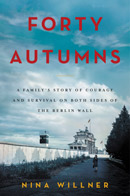 “Forty Autumns: a Family’s Story of Courage and Survival on Both Sides of the Berlin Wall,” by Nina Willner
“Forty Autumns: a Family’s Story of Courage and Survival on Both Sides of the Berlin Wall,” by Nina Willner
(William Morrow, pp 397, $27.99)
The title spells it all. “Forty Autumns,” is about survival on both sides of the Berlin Wall. If you know the history of the Cold War, you will quickly infer that we are talking about two different kinds of survival. East and West spell out different hardships. In the case of the East, we are dealing with communist repression on all fronts in a Big-Brother-like society, restriction of liberties, listening, spying, suspecting, ideological enforcement, in brief, a constant climate of distrust and cultivated fear. For the West, the survival is more nuanced. It comes from isolation, fragmented family, unfulfilled desires, which, perhaps, indirectly, is the consequence of the severed ties created by the Berlin Wall.
In this historical memoir, Nina Willner tells us the story of her family, the escape of her mother, Hannah, into the West, and her struggle to survive away from her family. A family she would only be reunited to 40 years later, after the fall of the Wall. “Forty Autumns,” emphasizes the metaphor that sometime politics and ideologies act as crushing silent forces standing in the way of families, and their reconciliation. What makes the book stand out from memoirs on the same topic comes from the author’s real life situation. Nina Willner worked for the American Intelligence and got to be stationed in Berlin, during the cold war, just a few miles away from her Eastern family . . . and got to lead missions into the Eastern block. No matter what, human spirit always prevails.